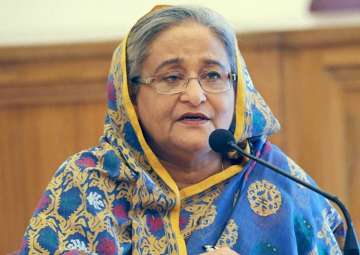Bangladesh Prime Minister Sheikh Hasina today accused neighbouring Myanmar of provoking a "war" amidst the Rohingya refugee crisis and said her government avoided the conflict by "exercising restraint".
She also said her government would continue to support nearly one million Rohingya Muslims who have fled the Buddhist-majority country to escape violence. Hasina said that at one stage after the forced exodus of Rohingyas the Myanmar "pretended like they wanted a war."
"The army, border guards and police were put on the alert, and I asked them not to act on any provocation without my order," Hasina said at Dhaka airport on her return from New York after attending the UN General Assembly session.
The UN has described the violence in Myanmar as "ethnic cleansing." Around 515,000 Rohingya Muslims have arrived in Bangladesh over the last five weeks after militant attacks on police check-posts in the Buddhist majority country sparked violent reprisals.
The latest influx of refugees began on August 25 when Myanmar's military launched a crackdown in the northern Rakhine state over alleged terrorist attacks on its police outposts. There are now more than 800,000 refugees living in Bangladesh near its border with Myanmar.
Rohingya, a Muslim minority, do not qualify for Myanmar citizenship even though many have lived there for generations while its army insists they are interlopers from across the border in Bangladesh.
Hasina said various quarters also wanted to create a situation to divert things in different direction but "we are very much cautious about that".
Hasina said Bangladesh took an appropriate stance to draw international community's attention to the Rohingya crisis which also compelled Myanmar to open talks on the issue.
She said for natural and humanitarian reasons Bangladesh offered the Rohingyas the shelter as they were exposed to "brutal atrocities" with their women, children and elderly people being the worst victims.
"If needed, we will eat one meal once a day and share the rest with these distressed people," she said.
Bangladesh last month said Myanmar drones and choppers violated its airspace repeatedly and installed landmines on its borders to prevent return of Rohingyas.
Dhaka also summoned several times the Myanmar ambassador to Bangladesh to protest the "provocation", warning that these "provocative acts" might lead to "unwarranted consequences".
Media reports suggested that Bangladesh had mobilised its air force and the navy in southeastern region bordering Myanmar. Officials, however, termed these moves as routine.
Facing international pressure, Myanmar's de-facto leader Aung San Suu Kyi this week sent a senior representative to Dhaka for talks. The two sides agreed on forming a joint working group to oversee the repatriation process. The prime minister thanked the Myanmar government for their revised gesture in opening up talks.
Latest World News
